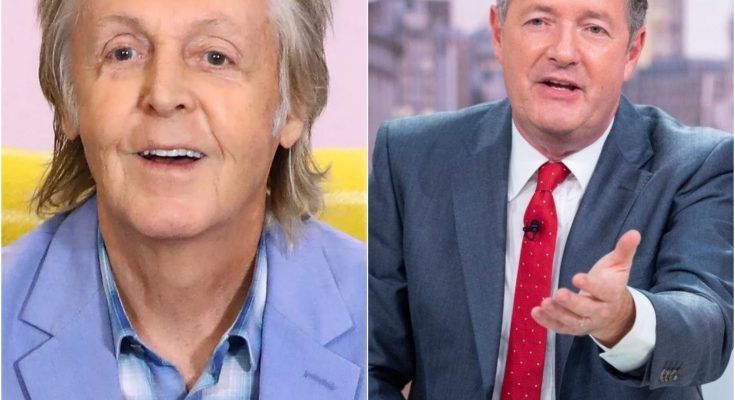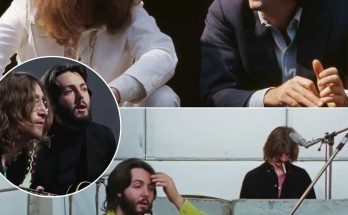In the stark, unforgiving glare of a live television studio, where hot takes often overshadow heartfelt truths, Sir Paul McCartney was handed an insult disguised as a question. Facing commentator Piers Morgan, who is known for his provocations, the music legend was accused of the one thing his entire career has defied: irrelevance.
“You’re just living off the Beatles—selling nostalgia to keep your old fame alive,” Morgan stated, not asked, his words hanging in the air like a challenge.
For a moment, the studio braced for a fight. The expected retort. A list of accomplishments. A defensive anger.
But McCartney did none of that. He simply folded his hands. He breathed. He waited in a silence that felt more powerful than any outburst. He allowed the cheap shot to land, and then evaporate in the face of his sheer, unshakeable calm.
Emboldened, the host pressed his advantage, mocking the idea that anyone still wanted to hear the “old songs” anymore. It was then that the energy in the room shifted palpably.
Paul McCartney looked up. He placed both palms firmly on the table, a gesture of grounding and immense, quiet authority. And he delivered a response so simple, so profound, that it would become the only thing anyone remembered from the entire exchange.
“But memories are what keep us.”
Six words. No more, no less.
The effect was instantaneous and electric. The cameras kept rolling, but the usual frantic energy of a live broadcast ceased. No producer whispered “continue” in an earpiece. Someone backstage was heard exhaling, a sound that seemed deafening in the new quiet. The audience sat perfectly still, frozen.
Morgan, rarely at a loss for words, offered just one slow blink. Then, silence. He had thrown a stone expecting to shatter glass and had instead struck the surface of an ocean, met with a depth that swallowed the insult whole.
In that moment, McCartney masterfully reframed the entire premise of the attack. He rejected the cynical label of “selling nostalgia” and replaced it with the human, universal truth of shared memory. He wasn’t selling a product; he was providing a vessel for collective experience. His music isn’t just a relic; it’s the soundtrack to first dances, family road trips, personal triumphs, and healing from heartbreaks. It is the fabric of millions of lives.
He didn’t need to defend his legacy with charts or sales figures. He defended it with the weight of a simple, unassailable truth. By speaking not as a rock star, but as a custodian of human connection, the man once branded “a Beatle clinging to the past” did what no one thought possible.
He froze an entire studio. Not with anger, ego, or a list of accolades. But with the quiet, devastating weight of what his music truly means. He reminded everyone that while fame fades and charts are forgotten, the memories we make—and the songs that score them—are what truly keep us alive.



